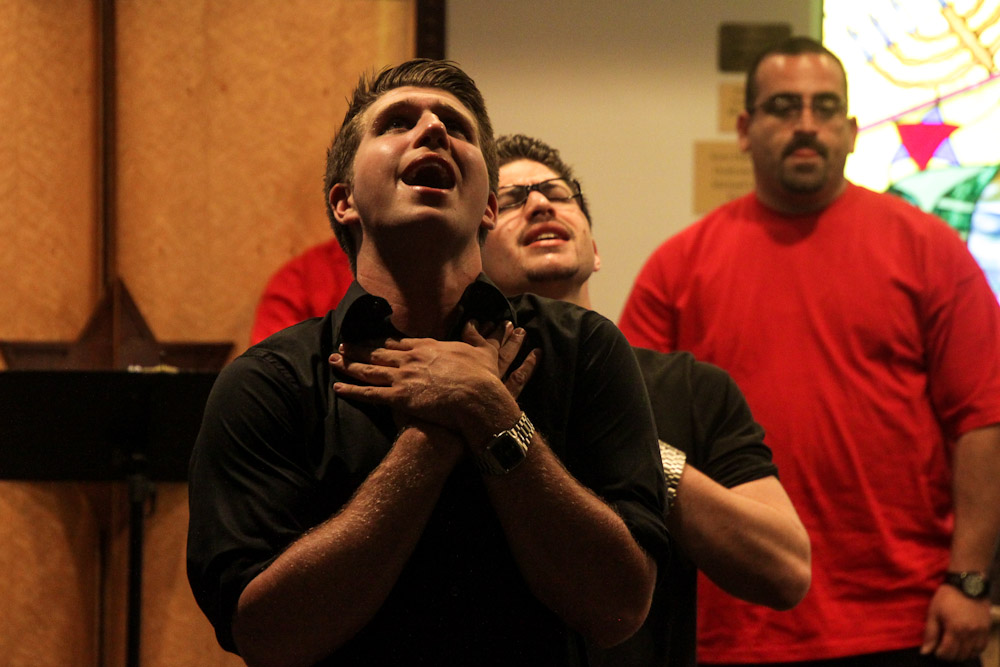Jewish Rehab Center Brings Musical to the Main Line


Los Angeles’ Beit T’Shuvah fights addiction the Jewish way: with song, dance and a musical about Passover.
It’s all part of the recovery curriculum at Beit T’Shuvah, the country’s first Jewish faith-based residential recovery facility, where the original musical “Freedom Song” has been drawing rave reviews for the past 14 years. It resonates with authenticity precisely because all of the actors, not to mention the show’s directors and producers, really lived through the kinds of events portrayed on stage.
“Freedom Song” has two principal set pieces: one centered around a family’s Passover Seder table, one at a 12-step recovery meeting. There’s a freedom-from-bondage metaphor that applies to Jews both ancient and modern.
This isn’t your typical Passover seder — or, maybe, to “Freedom Song’s” point, it’s more typical than many of us would like to admit. At the seder table we’re shown an ostensibly well-adjusted family but soon find out that one family member’s struggles with addiction have cast a pall not just over the seder but each family member’s everyday lives. The show reveals the extent to which addiction affects a person’s entire support system, most especially family members.
“People tend to really relate to the family they see onstage, whether it’s the overbearing father or the little sister who feels she’s been overlooked because somebody else in the family had a bigger problem,” said Michael Kaminer, Freedom Song’s director and a Beit T’Shuvah alumnus.
At the seder table, there’s a person missing, the family’s oldest daughter, who’s now two years into recovery. Despite her progress, her father has not allowed her back into the family. “Addiction is not just a disease of the addict; it’s a disease of the family,” Kaminer added.
Surely, part of “Freedom Song’s” purpose is to empower those in recovery, whether that recovery be from addiction to drugs, alcohol, gambling or really any of the myriad facets of modern life that we might depend on to our detriment. “We touch upon all the different things that are not necessarily drug addictions but are still disruptive behaviors in families and society in general,” Kaminer said. “One of Beit T’Shuvah’s taglines is ‘You don’t need to be an addict to be in recovery.’”
But, perhaps a higher priority for “Freedom Song” is to facilitate conversation, particularly among those who constitute a support system.
For too long, Kaminer says, families have felt the shame and stigma of addiction. There was a tendency, because of the attendant social embarrassment, to keep a family member’s addiction quiet and hope no one outside the family found out. Beit T’Shuvah found that Jewish families in particular struggled with this.
Initially, “Freedom Song” was to be just one part of a larger non-Beit T’Shuvah production titled “Passover Celebrations,” but L.A.’s Jewish community balked.
“Fourteen years ago,” Kaminer said, “a lot of the Jewish community shied away from the material we were discussing. They were hesitant to put it out there because of the subject matter. Which just told us, wow — this really needs to be done.”
Beit T’Shuvah went ahead and produced “Freedom Song” itself and has been doing so ever since, to the tune of 50 to 60 performances each year, which include two national tours annually and a full slate of home dates in Southern California.
In all, that’s approximately 350 to 400 cast members over those 14 years, all of whom go on to graduate from Beit T’Shuvah’s recovery program. Which is another important thing to note: “‘Freedom Song’ is a play but it’s also a program here at Beit T’Shuvah,” stressed Kaminer.
“‘Freedom Song’ is a huge part of people’s recovery,” adds Jessica Fishel, the musical’s producer and co-leader of Beit T’Shuvah’s youth outreach program. “This play not only allows the cast members to impart a really important message but it also teaches them about commitment, showing up, giving back, living in honesty and taking the negative things that have happened in their lives and using them to have positive effects on other people.”
So while “Freedom Song” allows cast members to share and to impart, it also repays them manifold for their efforts, most importantly by providing the framework for addiction’s Kryptonite — a full life, a good life. “When you live a good life, drugs and alcohol and destructive behaviors tend to not fit into that,” said Kaminer.
“It’s a community within a community,” Kaminer said of the “Freedom Song” experience. “It’s a fraternity that is undeniable and really, really strong.”
“Freedom Song” comes to Main Lain Reform Temple. Tuesday, Nov. 5, 7 p.m.
msilver@jewishexponent.com; 215-832-0737
 Pathways Drug Rehabilitation Luxury Addiction Treatment & Detox Center
Pathways Drug Rehabilitation Luxury Addiction Treatment & Detox Center


